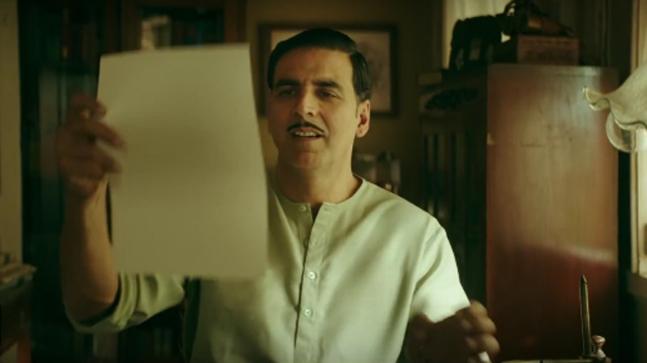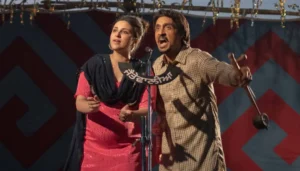
It is interesting how Reema Kagti decides to make Gold when Hindi cinema is going through a peculiar phase. The phase when almost every film is minting money at the box office, content around nationalistic fervour is selling like hotcakes much like the early ‘50s and, most importantly, stories have become extremely telltale. The target audience seems to have lost their ability to assimilate nuances and subtleties. Now, what if that is precisely the area where the filmmaker excels otherwise? Kagti, in her charming debut Honeymoon Travels Pvt. Ltd., rose above the somewhere loud, somewhere surreal surface and delivered a film that was high on details. She sunk a little deeper into the mood, the characters and their turmoil in her second venture Talaash – The Answer Lies Within. However, in Gold, the able director joins hands with a leading man (Akshay Kumar) who sensibilities are far cry from hers. Which school of thought emerges victorious? Well, neither of them do.
To set the context, Gold is the standard sports film, with a simple narrative arc offering very few surprises. It is also the standard Akshay Kumar film – complete with orations surplus and a temperament of nationalism running throughout. The Reema Kagti difference can be observed primarily in the character sketches, barring the slogan blurting leading man with a badly done accent who, after a point, jars badly. On one hand, we see Gold tackle internal team politics, the impact of the Radcliffe Line and the craving for an Olympic medal with dexterity. On the other, the film erupts with a tint of unusual loudness in the most unlikely moments. Right in the beginning, the National Hockey team lands up in Germany for the Olympic finals and we see a man of Indian nationality emerge out of nowhere to create a ruckus. He wants to unfurl the proposed Indian national flag and not the British one. While it isn’t fully problematic for the scene to exist in a film like this, the writing and the decibel levels prove otherwise. Why did it stick out? What did it add in to maintain the sombre mood of Gold? There are plenty of similar instances in the film’s not-so-short runtime.
To call for an immediate recall, Kumar’s Tapan Das is way close in design to John Abraham’s Ashwath in the recently released Parmanu. In both cases, the character motivations are more personal and the patriotic heft to the same is rendered with volumes of high-voltage dialogues. Then again, unlike John in the said film, Tapan Das’s say in the larger decision-making is restricted to delivering sermons. He is neither the coach [like say, Chak De India] nor a player like countless films in the genre. The film also doesn’t shy away from explaining his role, which further negates the impact of all the commercial trappings it comes with. Talking about that, the film’s stubbornness to belong to a certain bracket/space takes the content for a toss. There is a leading lady (Mouni Roy, acing the dialect in an insignificant part) and a spate of unnecessary songs which pop up intermittently, destroying the flow and the mood of the story. Reema feels the need to use dialogues even in moments they are not required and so does the existence of one-note characters (Monobina and the members of the Hockey Federation, to name a few).
Nevertheless, what makes Gold not completely unwatchable – in a paradox – is Reema’s own directorial skills. For sure, she is one filmmaker who knows her frames, the entries, the exits and the works. Be it a wide shot or the decision to leave the camera focused on an object, she is adept at creating a visual impression – which is equally puzzling with the excess use of spoken lines. The cinematography and the production design, while belonging to the stereotypical period film zone, largely comes alive in making us feel the era and the emotions. Editing might seem compromised in parts but the use of slow motion in certain key sequences accentuates the impact, even though it is slightly unlike Reema’s usual style. There are a handful of characters who have impressive graphs to themselves – especially Raghuvir (Amit Sadh, very good) and Himmat (Sunny Kaushal, fantastic). You also feel the chill of partition when Imtiaz (a wonderful Vineet Kumar Singh) is forced to flee to Pakistan. There are also tiny fascinating bits that Reema throws in. For instance, you see Kumar and his adversary from the federation share an umbrella as the crucial match nears the finale – something that might not have existed in films with an absolute black-and-white narrative.
Gold also effectively brings out how both India and Pakistan breeds the desire to beat England, as a minor revenge against years of oppression they suffered under colonial rule. And to the makers’ credit, the Hockey matches are not awfully shot (unlike the recent Soorma). You feel the buildup, the tension and also a need to hoot as the match concludes. The drama unfolds quite seamlessly in the penultimate minutes with a decent match followed by a montage which isn’t quite overdone. This excludes a small episode where Tapan Das delivers a monologue in his characteristic style, reminding that he shouldn’t have been a part of the scene in the first place.
Having said that, the solitary issue with Gold, however, is funnily a mammoth one – that of an identity crisis. A Reema Kagti film headlined by Akshay Kumar in itself is an odd proposition and the film ends up doing justice to neither parties. Gold does involve you in parts but the compromises to scale-up and templatize the project is noticeable. In the bargain, the film ends up more as a money-making proposition as opposed to being a passion project.
Rating: ★★ 1/2

